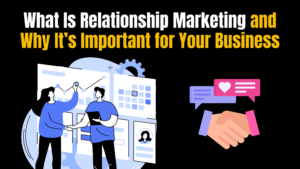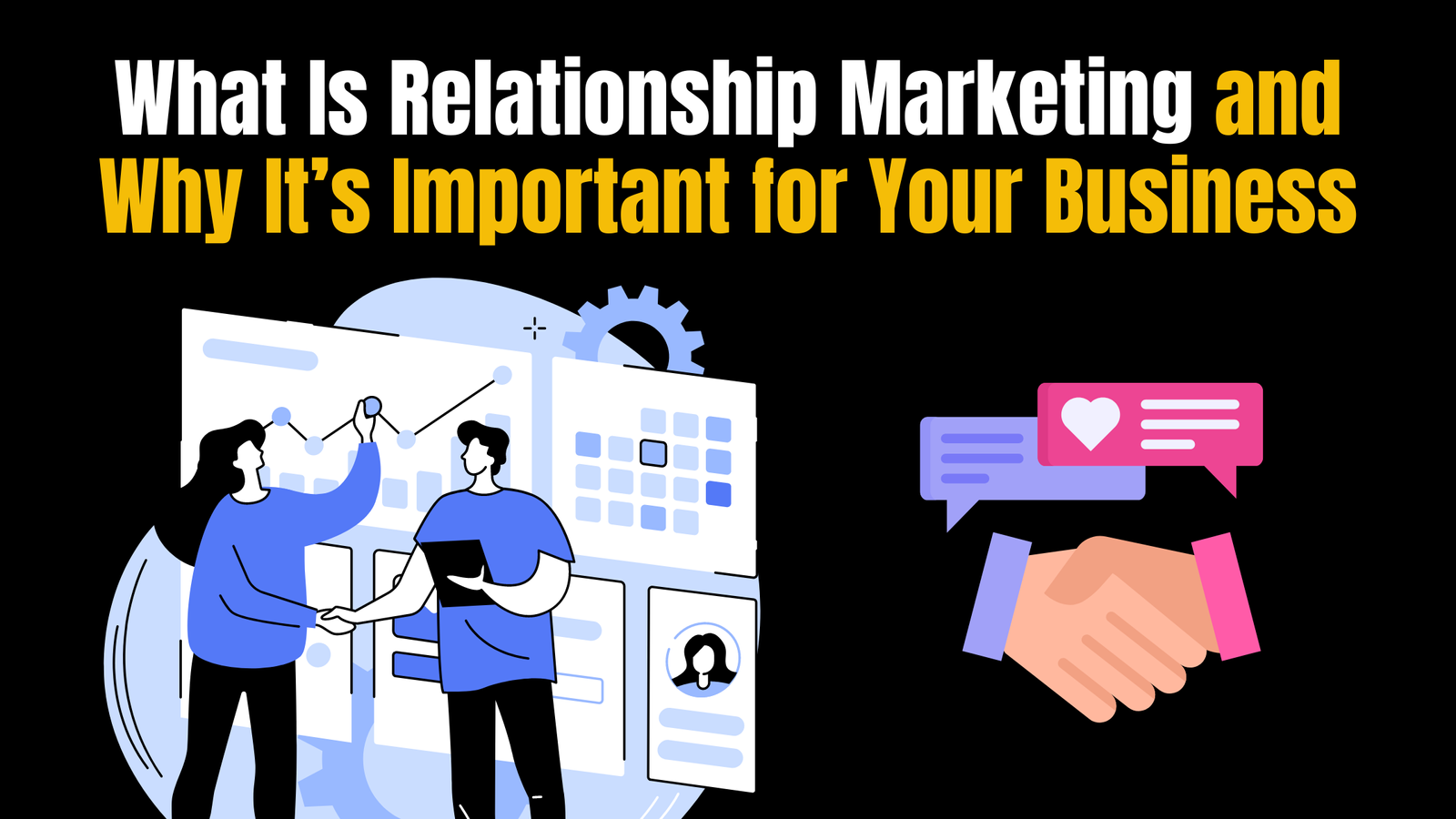What Is Relationship Marketing and Its Importance for Businesses
In today’s fast-paced digital world, where transactions are just a click away, businesses are increasingly looking for ways to stand out and retain customers over the long term. One strategy that has proven effective is relationship marketing. Unlike traditional transactional marketing, which focuses on one-time sales, relationship marketing emphasizes building long-term connections with customers. This article will explore what relationship marketing is, why it’s crucial for your business, and how to implement it successfully.

Understanding Relationship Marketing
Relationship marketing is a strategy designed to foster customer loyalty, interaction, and long-term engagement. It focuses on developing strong connections with customers by understanding their needs, preferences, and delivering value beyond the initial purchase. This approach aims to create a loyal customer base that is committed to your brand.
Understanding relationship marketing involves delving deeper into its fundamental principles, strategies, and outcomes. This approach contrasts with traditional marketing methods by prioritizing long-term customer engagement over immediate transactions. Here’s a more detailed exploration of relationship marketing:
Core Principles of Relationship Marketing
- Customer Centricity: At its core, relationship marketing revolves around the customer. It’s about shifting the focus from the product to the people who use it. Businesses adopting this strategy strive to understand and meet the evolving needs and desires of their customers.
- Value Creation: Beyond just selling a product or service, relationship marketing seeks to deliver added value to the customer. This could be through personalized experiences, exceptional service, or content that educates or entertains, thereby enriching the customer’s interaction with the brand.
- Continuous Engagement: Unlike transactional marketing, which ends with a purchase, relationship marketing seeks to maintain and enhance the relationship post-purchase. This involves regular communication through various channels, inviting feedback, and fostering a two-way conversation.
- Long-term Perspective: Relationship marketing is built on the belief that long-term customer relationships are more beneficial and profitable than single transactions. This long-term view influences strategies and decisions, focusing on sustainable growth through customer loyalty.
Strategies for Relationship Marketing
- Personalization and Customization: Leveraging data analytics to understand customer preferences and tailor marketing messages, offers, and products to meet individual needs.
- Quality Communication: Keeping in touch with customers through newsletters, social media, and other channels not just to sell, but to provide value through useful information or entertainment.
- Loyalty Programs: Rewarding repeat customers with discounts, exclusive offers, or perks as a way to thank them for their loyalty and encourage continued business.
- Community Building: Creating spaces, either online or offline, where customers can interact with each other and the brand, share their experiences, and feel part of a larger community.
- Exceptional Customer Service: Ensuring that every interaction with the company is positive, solving problems quickly and efficiently, and going above and beyond to meet customer needs.
Outcomes of Effective Relationship Marketing
- Increased Customer Loyalty: Customers who feel valued and understood are more likely to remain loyal to a brand, even in the face of competition.
- Higher Customer Lifetime Value (CLV): Loyal customers tend to spend more over time, increasing their CLV—a key metric that measures the total worth of a customer to a company over the entirety of their relationship.
- Positive Word-of-Mouth: Happy customers are more likely to share their positive experiences with others, acting as brand ambassadors and attracting new customers through the most trustworthy form of marketing.
- Enhanced Brand Reputation: Brands that are known for their strong customer relationships and exceptional service are viewed more favorably in the market, which can lead to increased market share and resilience against negative publicity.
In summary, understanding relationship marketing is about recognizing the importance of the customer beyond a single transaction. It involves strategies aimed at building long-term relationships characterized by trust, loyalty, and mutual value. The outcomes of effective relationship marketing not only benefit the customers through personalized experiences and exceptional service but also bolster the brand through increased loyalty, higher CLV, and a strong, positive reputation.
The Evolution of Relationship Marketing
The concept of relationship marketing has evolved significantly with the advent of digital technology. Social media platforms, email marketing, and CRM systems have made it easier for businesses to communicate with their customers and offer personalized experiences. This evolution has transformed relationship marketing from a nice-to-have into a must-have strategy for businesses in virtually every industry.
Why Relationship Marketing Is Essential
Building Trust and Loyalty
Trust is the cornerstone of any successful relationship, and this holds true in the business-customer relationship as well. Relationship marketing helps build trust through consistent, honest communication and by prioritizing the customer’s needs and feedback. This trust, in turn, fosters loyalty, which is invaluable in today’s competitive market.
Enhanced Customer Retention
Acquiring a new customer can be five times more expensive than retaining an existing one. Relationship marketing strategies focus on keeping customers satisfied and engaged, which significantly increases retention rates. High retention rates are not only cost-effective but also contribute to a stable revenue stream.
Word-of-Mouth Marketing
Satisfied customers are more likely to recommend your brand to others, leading to powerful word-of-mouth marketing. This form of marketing is incredibly effective because people tend to trust recommendations from friends and family over traditional advertising.
Competitive Advantage
In markets where products and prices are similar, relationship marketing can be a key differentiator. A brand that is known for valuing and nurturing its customer relationships will stand out and attract more customers.
Implementing Relationship Marketing in Your Business
Know Your Customers
The first step in relationship marketing is to understand your customers deeply. Use data analytics, surveys, and feedback to gather insights about their preferences, behaviors, and needs.
Personalize the Experience
Use the information gathered about your customers to personalize their experience with your brand. Personalization can range from tailored email marketing campaigns to customized product recommendations.
Focus on Customer Service
Exceptional customer service is a crucial component of relationship marketing. Ensure that your customer service team is responsive, empathetic, and empowered to solve problems efficiently.
Engage Through Social Media
Social media is a powerful tool for building relationships with customers. Use it to engage in conversations, share valuable content, and respond to customer inquiries and feedback promptly.
Create a Community
Building a community around your brand encourages customer engagement and loyalty. This can be achieved through social media groups, forums, or hosting events that bring your customers together.
Measure and Adjust
Continuously measure the effectiveness of your relationship marketing strategies and be willing to adjust your approach based on customer feedback and changing market dynamics.
Conclusion
Relationship marketing is no longer just an option; it’s a necessity for businesses that want to thrive in the modern marketplace. By focusing on building strong, trust-based relationships with your customers, you can enhance loyalty, increase retention, and create a competitive advantage. Implementing a successful relationship marketing strategy requires understanding your customers, personalizing their experience, providing exceptional customer service, and continuously measuring and refining your approach. Remember, at the heart of relationship marketing is the simple yet profound concept of treating your customers as valued partners in your business’s success.
Stay on top of the latest AI trends and developments with Disrt Infotech. Contact us today to learn more about our Funnel & Branding services and how we can help your business succeed online.






